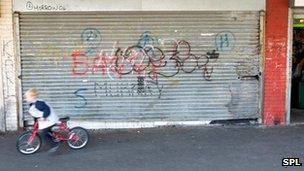Troubled families scheme for England 'working'
- Published

The government says it is now helping more than 23,000 troubled families in England
A three-year scheme aiming to turn around the lives of 120,000 of England's most troubled families is succeeding, the government says.
It pays councils for working with and turning around families with problems including worklessness and truancy.
Since April, it has identified 62,000 families to work with, is helping more than 23,000 and has made results-based payments for turning around 1,675.
Family Action said there was "some way to go" to reaching the 120,000 target.
The BBC's Mike Sergeant said that, while the project was in its early days, the numbers of "turned around" families would have to rise rapidly over the coming months.
The government defines "troubled families" as those experiencing problems including crime/anti-social behaviour, school exclusion or truancy and living on benefits, external.
Ministers say those families often suck in the resources of a range of agencies, from the police to social workers, teachers and doctors and estimate that each costs the taxpayer about £75,000 a year.
The government said that, as of December 2012, local authorities had identified some 62,000 of the most problematic families for a programme of intervention and were already helping more than 23,000 of them.
Local Government Secretary Eric Pickles said: "The Troubled Families programme is on track, changing families for the better and reducing their impact on the communities around them.
"This programme is getting to grips with some of the hardest-to-help families in the country and, in doing so, will help bring down the costs they incur to the taxpayer and the damage they do to communities."
Councils can be paid up to £4,000 for each family they help.
In the first year of the scheme, they have been given 80% of that total - or £3,200 - for each family they have helped as an upfront payment regardless of final results.
The upfront payments are reduced to 60% in 2013-14 and 40% in 2014-15.
Further results-based payments to take the total up to £4,000 are made if a family reaches a series of specific goals on measures including improved school attendance, a reduction in anti-social behaviour and reduction in juvenile crime.
At this stage the family is considered to have been turned around.
An adult getting a job is, on its own, enough to earn a family turned-around status and - for the council - the full £4,000 payment.
If the government is not satisfied with the performance of a council it can withhold future upfront payments as a way of clawing back some of the money spent.
By January, there were 1,675 families deemed to have been turned around.
Evidence 'skewed'
Rhian Beynon, head of policy and campaigns for charity Family Action, said: "It is good news for the 23,000 families who are getting the help they so desperately need, but it only represents a fifth of those that the government pledged to help with this programme by the end of this parliament."
That indicated the programme would have to be extended by the government "to ensure they have any chance of reaching their goal".
She said the difficulties of some families were "so entrenched", that councils would find it difficult "to ensure their progress hits the bar for the payment by results initiative on school attendance and anti-social behaviour".
The government update on its programme comes a week after it was accused of deliberately misusing evidence and statistics to misrepresent the plight of the poor.
A report from the Methodist and United Reformed Churches, the Church of Scotland and the Baptist Union said evidence had been skewed to put the blame for poverty at the door of the poor themselves.
The government said it had always made it clear that the system was failing people.
- Published1 March 2013
- Published22 January 2013
- Published11 June 2012